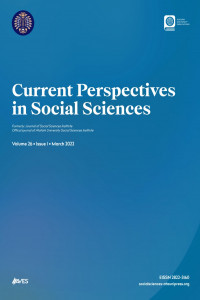From Postcolonial Social Contract to the Arab Uprisings: The Neoliberal Transformation of the State–Society Relations and the Alternative Spaces of the New Political Activism
Arab uprisings, legitimacy, neoliberalism, social contract, social media
___
- Abdulla, R. A. (2011). The revolution will be tweeted. The Cairo Review of Global Affairs. https://www.thecairoreview.com/essays/the-revolution-will-betweeted/.
- Achcar, G. (2013). The people want: A radical exploration of the Arab uprising. Berkeley, Los Angeles. University of California Press.
- Achcar, G., & Matta, N. (2016). Gilbert Achcar on the Arab upheaval—Facts and fiction. Journal of Balkan and Near Eastern Studies, 18(1), 1–15. [CrossRef]
- Adib-Moghaddam, A. (2013). On the Arab revolts and the Iranian Revolution: Power and resistance today. Bloomsbury Publishing Academic.
- Adly, A. I. (2009). Politically-embedded cronyism: The case of post-liberalization Egypt. Business and Politics, 11(4), 1–26. [CrossRef]
- Aggestam, K., Guazzone, L., Lindholm Schulz, H., Paciello, M. C., & Pioppi, D. (2012). The Arab State and Neo-Liberal Globalization. In L. Guazzone & D. Pioppi (Eds.). The Arab State and Neo-Liberal Globalization: The Restructuring of State Power in the Middle East (pp. 325–350). Ithaca Press.
- Alexander, A. (2011). Internet role in Egypt’s protests. BBC NEWS. https://www.bbc.com/news/world-middle-east-12400319.
- Başlangıç: 2003
- Yayıncı: Atatürk Üniversitesi
What Makes an Immigrant Prisoners Satisfied? The Case of Afghans in Turkey
Türkiye’de Gençlerin Sağlığa Erişimi Ne Ölçüde Karşılanıyor?
İbradı (Antalya) Eynif Ovası Yılkı Atları ve Türkiye’de Yılkı Atları Üzerine Genel Bir Değerlendirme
Berna ÖZOĞUL, Fatma EMİROĞLU AYDIN, İhsan BULUT
Birinci Dünya Savaşı Sürecinde ve Sonrasında Bursa ve Çevresinde Ermeni Faaliyetleri
Feriba Vefi, Roman ve Öykülerine Genel Bir Bakış
Antik Çağ’da Phûsis ve Etik: Platon, Aristoteles ve Stoacılar
İyimserlik Ölçeği: Geçerlik ve Güvenirlik Çalışması “Revizyon”
Müge YILMAZ, Abdullah ALDEMİR, Seher BALCI ÇELİK
